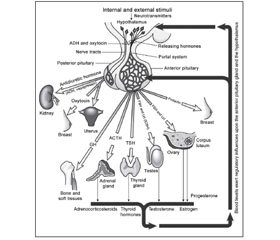Журнал «Боль. Суставы. Позвоночник» 1 (21) 2016
Вернуться к номеру
Hypopituitarism and bone
Авторы: Barbosa A.P., Mascarenhas M.R. - Endocrinology and Metabolic Diseases, Faculty Medicine
of Lisbon; Fracturary Osteoporosis Outpatient Clinic Endocrinology, Diabetes and Metabolism Department, Santa Maria Hospital; Duarte N., Poupino J., Faria C., Gomes A.C., Barbosa D., Silvestre C., Paixão R., Gomes V., Osório A.S., Sampaio F., Monteiro J. - Fracturary Osteoporosis Outpatient Clinic Endocrinology, Diabetes and Metabolism Department, Santa Maria Hospital; Bicho M. - Environmental Health Institute (Genetics Laboratory), Faculty of Medicine of Lisbon, Portugal
Рубрики: Ревматология, Травматология и ортопедия
Разделы: Медицинские форумы
Версия для печати
The article was published on p. 66
The pituitary gland is responsible for the production of several hormones that control peripheral target organs like thyroid, adrenals, gonads, breast and uterus and also blood vessels and kidneys.
/66.jpg)
Bone is also under the influence of the pituitary gland, which has both direct and indirect important effects on it, some of them not yet completely clarified. Growth hormone (GH) and FSH/LH and the gonadal steroid hormones (testosterone and estradiol) are responsible for the linear growth and affect the peak bone mass. Through life, the most important pituitary hormones influencing bone metabolism are ACTH, TSH, GH, FSH/LH and also Prolactin. GH (through IGF-1), TSH (through T3 and T4) and ACTH induce bone formation; FSH/LH (through gonadal steroids) and TSH affect positively the bone turnover because they inhibit bone reabsorption. On the opposite, Prolactin, TSH (through T3 and T4), ACTH (through cortisol) and GH (through IGF-1) induce bone reabsorption. Hypopituitarism can be due to one or to several pituitary hormones deficiency. GH deficiency suppresses bone turnover, while FSH/LH deficiency (and subsequent hypogonadism) increases it. Vertebral fractures can occur, even with normal BMD.

